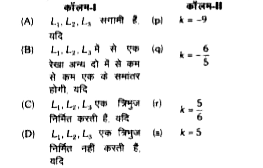(1+sinθ+icosθ1+sinθ−icosθ)n=
cos(nπ2−nθ)+isin(nπ2−nθ)
cos(nπ2+nθ)+isin(nπ2+nθ)
sin(nπ2−nθ)+icos(nπ2−nθ)
cosn(π2+2θ)+isinn(π2+2θ)
The correct Answer is:A
Step by step video, text & image solution for ((1+sintheta+icostheta)/(1+sintheta-icostheta))^n= by Maths experts to help you in doubts & scoring excellent marks in Class 12 exams.
Updated on:21/07/2023Topper's Solved these Questions
- सम्मिश्र संख्यायेंBook:ERRORLESS HINDIChapter:सम्मिश्र संख्यायेंExercise:Exercise
Explore 117 Videos
- सम्मिश्र संख्यायेंBook:ERRORLESS HINDIChapter:सम्मिश्र संख्यायेंExercise:Jee Advanced (More than one correct Answers)
Explore 23 Videos
- सम्मिश्र संख्यायेंBook:ERRORLESS HINDIChapter:सम्मिश्र संख्यायेंExercise:Solved Multiple Choice Questions (सम्मिश्र संख्याओं की ज्यामिति)
Explore 42 Videos
- समुच्चय सिद्धान्त तथा सम्बन्ध Book:ERRORLESS HINDIChapter:समुच्चय सिद्धान्त तथा सम्बन्ध Exercise:JEE Advanced (Reasoning type questions)
Explore 3 Videos
- सरल रेखा Book:ERRORLESS HINDIChapter:सरल रेखा Exercise:JEE ADVANCE (Matrix Match type questions)
Explore 4 Videos
Similar Questions
यदि z≠0 एक सम्मिश्र संख्या हो, तो
View Solutionमाना z1 तथा z2 दो सम्मिश्र संख्याएँ इस प्रकार है कि z1≠z2 तथा |z1|=|z2| . यदि z1 धनात्मक वास्तविक भाग तथा z2 ऋणात्मक काल्पनिक भाग है, तब z1+z2z1−z2 होगा
View Solutionसमीकरण z¯z+a¯z+¯az+b=0,b∈R एक वृत्त निरूपित करेगा यदि
View Solutionमाना R वास्तविक संख्याओं का समुच्चय है
कथन-1 : A={(x,y)∈R×R:y−x एक पूर्णांक है} R पर एक तुल्यता संबंध है |
कथन-2 : B={(x,y)∈R×R:x=αy किसी परिमेय संख्या α के लिए} R पर एक तुल्यता संबंध है |
View Solution
View SolutionIf I= [[1,0],[0,1]] , J = [[0,1],[-1,0]] and B = [[costheta, sintheta],[-sintheta, costheta]] , then B= (A) Icostheta+Jsintheta (B) Icostheta-Jsintheta (C) Isintheta+Jcostheta (D) -Icostheta+Jsintheta
View SolutionIf I=[1001] , J=[01−10] and B=[cosθsinθ−sinθcosθ] , then B equals a) Icosθ+Jsinθ (b) Isinθ+Jcosθ (c) Icosθ−Jsinθ (d) Icosθ+Jsinθ
View SolutionIf θ∈Randi=√−1,then(1+sinθ+icosθ1+sinθ−icosθ)n is equal to
View Solution(1+sinθ+icosθ)n
View SolutionIf (1+cosθ+isinθsinθ+i+icosθ)4=cosnθ+isinnθ then n=
View Solution(1+sinθ+icosθ1+sinθ−icosθ)n
View SolutionIf z=sinθ−icosθ then for any integer n
View SolutionIf n is positive integer prove that
(1+sinθ+icosθ1+sinθ−icosθ)n=cosn(π2−θ)+isinn(π2−θ).
View SolutionFor n∈Z+,
(1+sinθ+icosθ)n+(1+sinθ−icosθ)n=
View Solutionযদি z=sinθ−icosθ হয় , তবে n -এর যে-কোনাে পূর্ণমানের জন্য-
View Solution